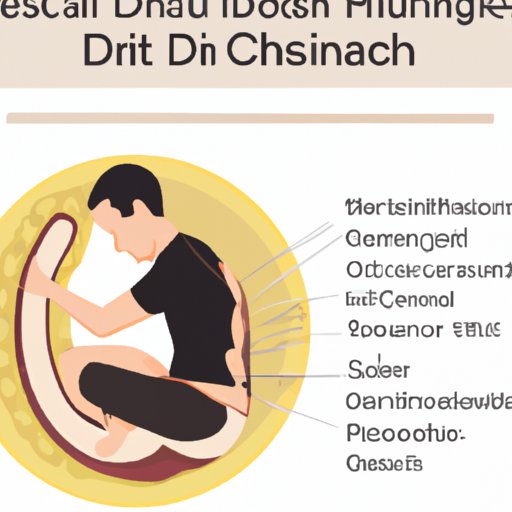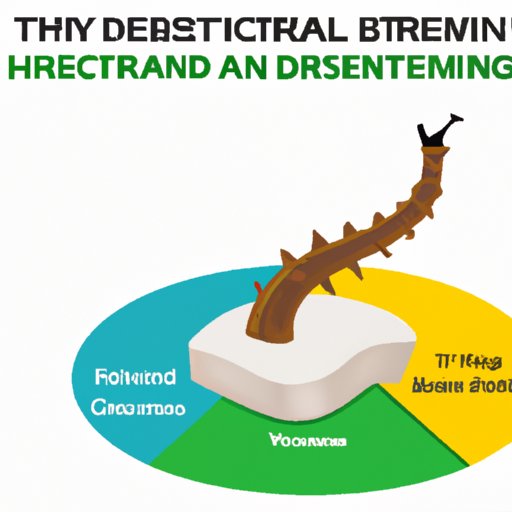
Introduction
A herniated disc, also known as a slipped or ruptured disc, occurs when the soft center of a spinal disc pushes through a crack in the tougher exterior. This can cause pain, numbness, and weakness in the back, legs, and arms. It is essential to treat a herniated disc to prevent further complications and improve one’s quality of life.
10 Natural Remedies for Healing Herniated Discs
There are several natural remedies that can aid in the healing of a herniated disc:
- Acupuncture: a traditional Chinese therapy that involves the insertion of thin needles into specific points on the body to stimulate healing and relieve pain.
- Massage therapy: a hands-on therapy that can help reduce muscle tension, improve circulation, and promote relaxation.
- Anti-inflammatory diet: a diet loaded with foods that have anti-inflammatory properties such as leafy greens, berries, and fatty fish.
- Herbal remedies: plants such as turmeric, ginger, and boswellia have anti-inflammatory properties and can provide relief for herniated disc pain.
- Yoga: a low-impact exercise that can improve flexibility and reduce stress on the spine.
- Meditation: a practice that can help reduce stress and promote relaxation which can aid in pain relief.
- Aromatherapy: the use of essential oils, such as lavender and peppermint, can help reduce muscle tension and promote relaxation.
- Chiropractic care: a complementary therapy that involves spinal adjustments to help reduce pain and improve spinal alignment.
- Physical therapy: a treatment that involves exercises to help reduce pain, improve range of motion and flexibility, and strengthen the muscles supporting the spine.
- Supplements: natural supplements such as magnesium, glucosamine, and chondroitin can help reduce inflammation and joint pain.
The Complete Guide to Treating Herniated Discs at Home
There are several self-care techniques and home remedies one can use to aid in the healing of a herniated disc in the comfort of their own home:
- Ice and heat therapy: applying ice for the first 48 – 72 hours and then heat after can help reduce inflammation and relieve pain.
- Rest: taking time to rest and avoid strenuous activities that can worsen the herniated disc’s condition.
- Over the counter medications: Nonsteroidal anti-inflammatory drugs (NSAIDs), such as ibuprofen, can help reduce pain and inflammation.
- Proper body mechanics: practicing good posture, lifting heavy objects correctly, and avoiding activities that require prolonged sitting or standing can help reduce spine pressure.
Exploring Physical Therapy Options for Herniated Disc Relief
Physical therapy is a treatment option that can help reduce herniated disc pain by improving range of motion, strengthening the muscles supporting the spine, and improving posture. Below are some types of physical therapy for herniated disc relief:
- Stretching exercises: can help improve flexibility and relieve pressure on the spine.
- Strengthening exercises: can help improve muscle support around the spine and reduce herniated disc pain.
- Spinal decompression therapy: a treatment that involves using traction to help relieve pressure on the herniated disc and promote healing.
5 Easy Exercises to Alleviate Herniated Disc Pain
There are several simple exercises that can be done at home to help alleviate the pain caused by a herniated disc:
- McKenzie exercises: involve using gentle movements and positions to relieve pressure on the spine and reduce pain.
- Bird dog: a strengthening exercise that focuses on strengthening the muscles supporting the spine.
- Spine stretch: an exercise that focuses on flexibility and can help reduce pressure on the herniated disc.
- Floor Angels: involves lying on the floor and slowly raising and lowering the arms to loosen up the upper back muscles.
- Wall Angels: mimic the motion of snow angels while standing up against a wall to help relieve upper back pain.
The Benefits of Chiropractic Care for Herniated Disc Treatment
Chiropractic care involves spinal adjustments, soft tissue therapies, and exercises to help reduce pain and improve spinal alignment. It can help aid in the treatment of a herniated disc by relieving pressure on the spine, reducing muscle tension, and promoting healing.
What You Need to Know About Surgery for Herniated Disc Repair
While rare, surgery may be necessary to repair a herniated disc. Surgical options include:
- Laminotomy: involves removing a small portion of the lamina that covers the spinal cord.
- Discectomy: involves removing a portion of the herniated disc that is pressing on the nerves.
- Microdiscectomy: a less invasive surgery that involves removing a herniated disc using a small incision and a microscope.
- Spinal fusion: involves fusing two vertebrae together to provide stability to the spine.

A Comprehensive Guide to Choosing the Best Treatment Option for Your Herniated Disc
It is essential to consult with a healthcare professional to determine the best treatment option for each individual’s herniated disc. This can include a combination of natural remedies, self-care techniques, physical therapy, chiropractic care and, in rare cases, surgery. It is important to take action towards treating a herniated disc to prevent further complications and improve one’s quality of life.
Conclusion
While a herniated disc can be painful and disruptive, there are several treatment options available to help alleviate symptoms and promote healing. By using a combination of natural remedies, self-care techniques, physical therapy, and chiropractic care, one can find relief from herniated disc pain. If surgery is necessary, it can provide the necessary relief to resume normal life activities. By consulting with a healthcare professional, one can determine the best treatment option for their herniated disc and take action towards improving their quality of life.




